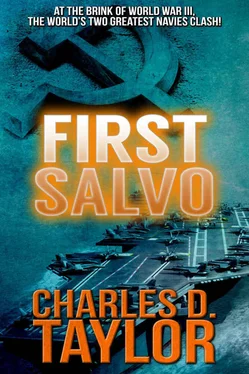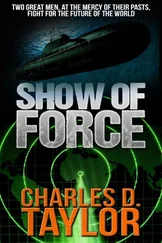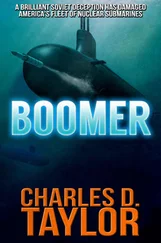Far above the two ships, invisible to both of them, the incident had been recorded and transmitted instantly to Washington. A simple electronic order was then given. With a quiet whirr, the camera perched 150 miles above changed its orientation minutely and began recording another such incident less than fifty miles away.
This time the Russians had been caught, their actions filmed. The film from outer space was clearer than slides taken at a family outing at the beach. When the Russian news agency announced the American aggression and requested UN censure, the pictures would speak for themselves.
There was never a word from Washington about their SOSUS system. In the Kremlin, it was an entirely different story. The Russians officially protested four separate incidents in the Sea of Japan involving U.S. and Soviet military ships. In each case, the Russians charged that American ships harassed Soviet units without provocation, causing damage and some injury to personnel. Anticipating this ploy, the White House authorized the U.S. ambassador to the United Nations to distribute satellite photos to Security Council members to reinforce American charges of Russian aggression in each instance.
Well before the incidents in the Sea of Japan, however, the president learned that a relatively junior admiral had developed a series of unique war scenarios via the Naval War College computer system, scenarios that emphasized Soviet activity in another part of the world. The officer had become convinced that, while Soviet ground forces would attack with a blitzkrieg-type offense across Central Europe even before their naval supremacy was certain, defeat of the Russian naval forces in the North Atlantic and the Mediterranean would stop the ground war in its tracks.
No matter the variations he programmed, three objectives continued to be paramount: 1) deny the Soviet Union control of the Mediterranean by means of the Sixth Fleet; 2) deny the attack submarines of the Soviet Northern Fleet access — via the Greenland-Iceland-United Kingdom (GIUK) gap — to our vital resupply routes to Europe; 3) neutralize the Soviet ability to threaten and/or carry out strategic nuclear warfare.
It was explained in more detail to the president that the Soviet Army would roll through Europe to the Atlantic coast unless the U.S. Navy and its NATO allies could support those three objectives. The point was not to allow the Russians to establish a second front on Europe’s Mediterranean shores. If this occurred, NATO ground troops would be forced to divide their strength; that would insure their defeat, since the USSR had considerably more troops, aircraft, and armor. They could afford a dual front and NATO could not. Of equal concern would be resupply of NATO forces from the United States. Soviet doctrine was based on the belief that their strike forces could overwhelm defending forces so rapidly that they would capture or destroy most NATO military stockpiles long before the shock of their offensive wore off. NATO could survive only if the North Atlantic supply routes remained open. Therefore, the Russians would attempt to flood the North Atlantic with their formidable Murmansk-based submarine force if they were allowed to escape the GIUK. The final threat — the use of strategic nuclear weapons — had to be neutralized. The president noted that there was no solution offered for the last problem.
But he knew that if somehow these three objectives could be accomplished, Moscow would either withdraw or sue for peace.
The next day the president asked for the admiral’s service jacket. Rear Admiral David Pratt’s record presented a picture of a rather different sort of officer than appeared in the forefront of the Washington scene. Most admirals that found their way into the Pentagon and then, if they were lucky, into providing military advice to the Oval Office, wore the wings of a naval aviator or a submariner’s dolphins. David Pratt displayed neither on his uniform blouse, nor was he festooned with ribbons. His only combat assignments had been early in his career in Vietnam.
Pratt was considered a maverick within the military power structure. Though not an engineer, he was involved in more new weapons planning than any other senior officer. He was also a devotee of computers as the first line of defense, and offense, for the Navy of the future — and he committed himself up front when he felt he was right. That was a rare trait among those looking forward to a successful career.
The one final aspect that became apparent to the president was that there were occasional gaps in Pratt’s service record — small, but there nevertheless — something not normally occurring with most Hag officers. A little digging brought forth the fact that Admiral Pratt was a maverick in more ways than one: he had deep contacts in intelligence sectors, both military and civilian. And word of mouth elicited the fact that Pratt still consorted with an odd variety of men, some of whom had reached the top in covert-action specialties that the military did not freely admit to.
All in all, Pratt had intriguing possibilities. As far as the president was concerned, he was the right man for the job.
WASHINGTON, D.C., A HOTEL ON K STREET
Bernie Ryng glanced up for a moment when Pratt crumpled the latest Strategic Situation Report in his fist, jamming it in his jacket pocket. He chuckled as the Admiral growled to himself, then wandered over to look out the floor-to-ceiling window. Always grumbling about something , Ryng thought to himself. It’s nice to see nothing has changed.
Pratt stared down into the jam of noontime traffic on K Street. The day was hot in Washington. He watched the secretaries in skimpy summer blouses and skirts hurrying alongside the young bureaucrats with jackets over their arms.
Pratt’s gaze was riveted on a pretty blonde whose mincing walk was attracting the stares of passersby, but in fact his mind was on his meeting with the president. It seemed just yesterday, but it was longer than that. It had been before the Russians had become serious.
Long ago, he had become inured to the fact that he would not be one of those admirals who would be invited to the Oval Office to rub elbows with the president and offer reassurance. Therefore, it was doubly surprising when the president not only brought him to the office alone, but then, after the interview centered on that part of his background that the official navy disclaimed, indicated that Dave Pratt was the man he wanted. In Navy circles, the term was called “reaching down.” It meant that the man in power was overlooking the most senior officers and dipping into the batch of juniors for the man he wanted. It was an exceedingly uncommon occurrence.
“You’re going to be in overall command, Admiral Pratt. While your major responsibility, when and if the shooting starts, will be in the Mediterranean, I’m going to ask you to put your actions where your mouth has been.” Suddenly, all Pratt could think of was how many times he had been told that someday he’d regret opening his big mouth so much.
“I’ve reviewed the three-point program you outlined not so long ago.” There had been a pause that seemed to last an eternity before the president continued. “And I happen to agree with you. Things may not occur exactly as you’ve presented them in your scenarios, but—” here he moved his head from side to side as if to show he was balancing each point, “—but I know of no other presentation that comes so close to what seems to be taking place right now.”
The discussion had gone on for another half hour about the military aspects of the proposed Soviet offensive and the importance of the Mediterranean, but Pratt sensed there was really much more to come. Then the president had raised his eyebrows. “You remember early on I indicated you were to be in overall command? Well, I meant that in every sense of the word. We’ve got to keep the sea-lanes in the North Atlantic open, and that means keeping all those attack submarines from passing through the GIUK gap.”
Читать дальше












